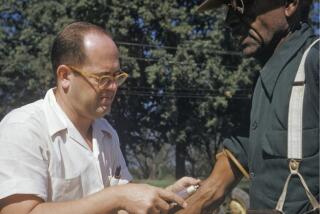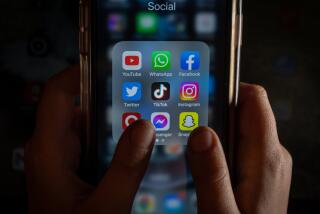Blacks’ Hopes Bright
WASHINGTON — A significant number of America’s blacks dream of owning their own businesses rather than joining a law firm, a medical practice or an established corporation, a poll shows.
More than two-thirds of those surveyed said they would like to be entrepreneurs, one sign of economic optimism found in the National Urban League’s annual review of black America.
The survey, set for release Wednesday, finds that many blacks believe rap musicians are bad role models. A majority said they are unconcerned about getting AIDS.
Despite the enthusiasm for business ownership, only 10% of the respondents now work for themselves.
“It’s very American to be one’s own boss,” said Roderick Harrison, an analyst for the Joint Center for Political and Economic Studies. “When you’re sitting at home at night tired from work, you can think of that--or of winning the lottery. That’s largely dreaming.”
The number of minority-owned businesses increased steadily in the 1990s, to 2.8 million, or 15% of American businesses, in 1997, according to census data. The 30% growth rate of minority businesses outpaced the 7% increase for all businesses over a five-year period, though they did not do as well financially.
“In 1960, you would have said, ‘I could run a barbershop, a corner grocery store.’ [Now] there are opportunities that did not exist in the 1960s at all,” said William Spriggs, director of the Urban League’s Institute for Opportunity and Equality.
But Spriggs warned, “The door is cracked; it’s not wide open.”
“There’s a sense that the world is our oyster, there will be no more boundaries,” said Karla Ballard of Wilmington, Del., a 30-year-old consultant.
Nearly three-fourths of those surveyed said they are better off than their parents. Forty percent said affirmative action played an important role in their success.
Top concerns of those polled were racism and jobs (21% each), education (11%), unity (7%) and crime (6%). They also mentioned fears about drugs and police brutality. Almost three-fourths said the criminal justice system is biased against blacks.
Blacks of all ages gave rap artists a bad rating. The majority (76%) said the musicians were not good role models. Spriggs said blacks don’t like the image perpetuated by rap artists.
“That image of black youth is the one that confronts them the hardest when they go to interview for a job, when they go to the store and get followed by a security guard, when they get pulled over by police,” he said.
Urban League President Hugh B. Price said the poll shows more needs to be done to educate blacks about AIDS. More than 70% said they were not very worried about contracting the virus that causes AIDS, and about half had changed their behavior to avoid contracting HIV. He said those numbers are worrisome because 1 in 50 black men and 1 in 160 women have HIV.
“For quite a while it was perceived as a problem confined in the gay community, in Africa,” Price said. “There was a delayed reaction of it kicking in with the minority community.”
More to Read
Sign up for Essential California
The most important California stories and recommendations in your inbox every morning.
You may occasionally receive promotional content from the Los Angeles Times.










